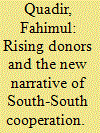| Srl | Item |
| 1 |
ID:
121762


|
|
|
|
|
| Publication |
2013.
|
| Summary/Abstract |
This article aims to provide a critical analysis of how the 'emerging donors' are redefining the structure of development cooperation in the new millennium. It offers an overview of the growing role of Brazil, China, India and South Africa in shaping the conditionally driven framework of official development cooperation. By reviewing the aid coordination mechanisms of the Southern donors, the article also seeks to provide a context for comprehending the challenges for Southern countries to systematically manage, monitor and deliver aid. It argues that the Southern donors' interest in changing the dominant conditionality driven narrative of aid has opened up the possibility for constructing a new aid paradigm that focuses more on the strategic needs of the partner countries than on advancing the ideological interests of the donor countries. However, without assuming a much greater role in providing overseas aid and without building a unified platform based on a shared development vision, Southern donors will not be able to meaningfully alter the current dac -dominated aid architecture.
|
|
|
|
|
|
|
|
|
|
|
|
|
|
|
|
| 2 |
ID:
118656


|
|
|
|
|
| Publication |
2012.
|
| Summary/Abstract |
There is general consensus in scholarly and policy circles that the global aid regime is undergoing major changes. Analysts have examined the emerging trends in development cooperation, and have identified the 'emerging donors' and other 'non-DAC [Development Assistance Committee] donors' as the source of important quantitative shifts in global aid flows (Manning 2006). Some scholars have described systemic fracturing in the established global aid regime (Woods 2008), while others have discussed the declining effectiveness of the traditional donors, a weakening of the so-called 'Washington Consensus' or the decline in the conventional structures of the aid delivery mechanism led by the Organization of Economic Cooperation and Development (OECD) DAC (Lancaster 2007; Birdsall and Fukuyama 2011; Chaturvedi et al 2012). There is a burgeoning literature around the impact of the rising states on Africa, in trade, aid and investment, society and politics, especially China's impact (Taylor 2006; 2008; Alden 2007; Rotberg 2008; De Haan 2010; Krageland 2011). Yet much is to be done in terms of systematically and critically analysing the details of the policy intentions, political-economic motivations and programing objectives of the BRICS (Brazil, Russia, India, China and South Africa) as aid providers and their impact on the less developed countries.
|
|
|
|
|
|
|
|
|
|
|
|
|
|
|
|